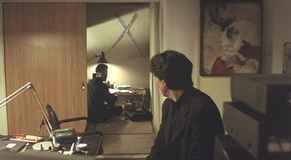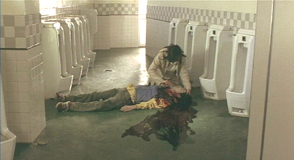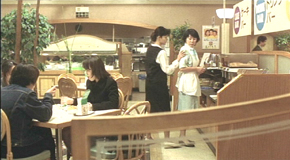Cure (Kiyoshi Kurosawa, 1997)
 It’s taken me a while to warm to
Kiyoshi Kurosawa’s movies (and I’m not all the way there yet), but that’s
at least partially because of the consistency of their negative worldview. The
relentlessly dour mood is off-putting, but after a few movies it starts to grow
in power, or at least it becomes more understandable as a distinct point of
view. In order to fully appreciate how pervasive it is in Kurosawa’s vision of
modern horror, one probably should look at his body of work, instead of just
individual films. In each of his movies the horror elements are a manifestation
of a larger brand of discontent, plainly on view. Essentially, he makes the
subtext in these movies the text itself, which ironically leads to an experience
that is more intellectual than emotional. The approach is a definite change of
pace for the sensationalistic horror genre, but it’s not without its caveats.
Using societal malaise as a universal excuse for his genre exercises comes off
as a bland, almost obligatory front at the same time it provides the viewer a
gateway into his films’ deeper meanings. Kurosawa’s movies are distinctive
to me, but are generally too turgid to be truly enjoyable (much less
frightening!). His muffled style becomes less frustrating if one gets to the
point where it becomes fully expected, but that’s hardly an excuse for it. In Cure,
generally regarded as his best film, the same problems exist for me as in his
less roundly respected works.
It’s taken me a while to warm to
Kiyoshi Kurosawa’s movies (and I’m not all the way there yet), but that’s
at least partially because of the consistency of their negative worldview. The
relentlessly dour mood is off-putting, but after a few movies it starts to grow
in power, or at least it becomes more understandable as a distinct point of
view. In order to fully appreciate how pervasive it is in Kurosawa’s vision of
modern horror, one probably should look at his body of work, instead of just
individual films. In each of his movies the horror elements are a manifestation
of a larger brand of discontent, plainly on view. Essentially, he makes the
subtext in these movies the text itself, which ironically leads to an experience
that is more intellectual than emotional. The approach is a definite change of
pace for the sensationalistic horror genre, but it’s not without its caveats.
Using societal malaise as a universal excuse for his genre exercises comes off
as a bland, almost obligatory front at the same time it provides the viewer a
gateway into his films’ deeper meanings. Kurosawa’s movies are distinctive
to me, but are generally too turgid to be truly enjoyable (much less
frightening!). His muffled style becomes less frustrating if one gets to the
point where it becomes fully expected, but that’s hardly an excuse for it. In Cure,
generally regarded as his best film, the same problems exist for me as in his
less roundly respected works.
 The story of a Japanese philosophy
student turned serial killer who emerges from chronic amnesia to spurn people to
commit murder, Cure boldly suggests that we are only separated from our
inner impulses to kill by societal coding. Because the story is told primarily
through the perspective of Takabe (Koji Yakusho), an investigating homicide
detective, there’s much hand wringing over the motives for the killings.
Takabe’s partner repeatedly suggests that the “devil made them do it”,
making it obvious how often such impulses aren’t explicable using the lexicon
society provides (and alluding to the fact that they are, indeed, suppressed).
The horror that Kurosawa comes up with suggests that the will to kill is lurking
just under our surfaces, and it’s at least ostensibly more frightening than
any more mundane explanation (the last shot is chilling, for certain). Even the
fallback rationalization that the killer is manipulating these people into
acting out his will is shot down with the disturbing reminder that hypnotism
can’t force someone to act against their own morality. It’s a great setup,
raising themes such as violence’s ability to be spread like a virus, the
possibility that ritual and habit have superceded morality, and the way that
communication serves as an invitation for corruption. Unfortunately, it’s
ultimately more interesting in theory than execution.
The story of a Japanese philosophy
student turned serial killer who emerges from chronic amnesia to spurn people to
commit murder, Cure boldly suggests that we are only separated from our
inner impulses to kill by societal coding. Because the story is told primarily
through the perspective of Takabe (Koji Yakusho), an investigating homicide
detective, there’s much hand wringing over the motives for the killings.
Takabe’s partner repeatedly suggests that the “devil made them do it”,
making it obvious how often such impulses aren’t explicable using the lexicon
society provides (and alluding to the fact that they are, indeed, suppressed).
The horror that Kurosawa comes up with suggests that the will to kill is lurking
just under our surfaces, and it’s at least ostensibly more frightening than
any more mundane explanation (the last shot is chilling, for certain). Even the
fallback rationalization that the killer is manipulating these people into
acting out his will is shot down with the disturbing reminder that hypnotism
can’t force someone to act against their own morality. It’s a great setup,
raising themes such as violence’s ability to be spread like a virus, the
possibility that ritual and habit have superceded morality, and the way that
communication serves as an invitation for corruption. Unfortunately, it’s
ultimately more interesting in theory than execution.
 Much to its detriment, Cure is so
high-minded that it ceases to be a whodunit about halfway though its runtime.
Once the instigator of the crimes is apprehended, it turns into a protracted
interrogation with unknowable evil (which naturally resides in all of us), and
the plot comes to a standstill. The languidly paced movie begins to wallow in
its philosophical concerns, which is a lamentable thing, since the first half of
the story raised those questions without betraying the genre. Though there’s a
memorable final confrontation in the protagonist’s mind, and a heck of a
closing, most of the film’s second half isn’t nearly moody enough. When it
falls on Kurosawa to demonstrate the way that his villain can pull people in
with his hypnosis, he doesn’t succeed. Werner Herzog and Lars Von Trier have
managed to make hypnosis a convincingly cinematic phenomenon, but here,
there’s just a lot of somnambulistic speaking and a deadly pace. Kurosawa
seemingly doesn’t have the formal chops to match his grand ambitions, and
it’s a shame. As a result, the bulk of the movie, in which the ideas stampede
over the genre and style, is a lot less intriguing than the more conventional
aspects, even if once can discern a deepening themes. Essentially, like each of
Kurosawa’s movies to date Cure isn’t quite able to overcome the
problems that ail it.
Much to its detriment, Cure is so
high-minded that it ceases to be a whodunit about halfway though its runtime.
Once the instigator of the crimes is apprehended, it turns into a protracted
interrogation with unknowable evil (which naturally resides in all of us), and
the plot comes to a standstill. The languidly paced movie begins to wallow in
its philosophical concerns, which is a lamentable thing, since the first half of
the story raised those questions without betraying the genre. Though there’s a
memorable final confrontation in the protagonist’s mind, and a heck of a
closing, most of the film’s second half isn’t nearly moody enough. When it
falls on Kurosawa to demonstrate the way that his villain can pull people in
with his hypnosis, he doesn’t succeed. Werner Herzog and Lars Von Trier have
managed to make hypnosis a convincingly cinematic phenomenon, but here,
there’s just a lot of somnambulistic speaking and a deadly pace. Kurosawa
seemingly doesn’t have the formal chops to match his grand ambitions, and
it’s a shame. As a result, the bulk of the movie, in which the ideas stampede
over the genre and style, is a lot less intriguing than the more conventional
aspects, even if once can discern a deepening themes. Essentially, like each of
Kurosawa’s movies to date Cure isn’t quite able to overcome the
problems that ail it.
50
Jeremy Heilman
06-03-04